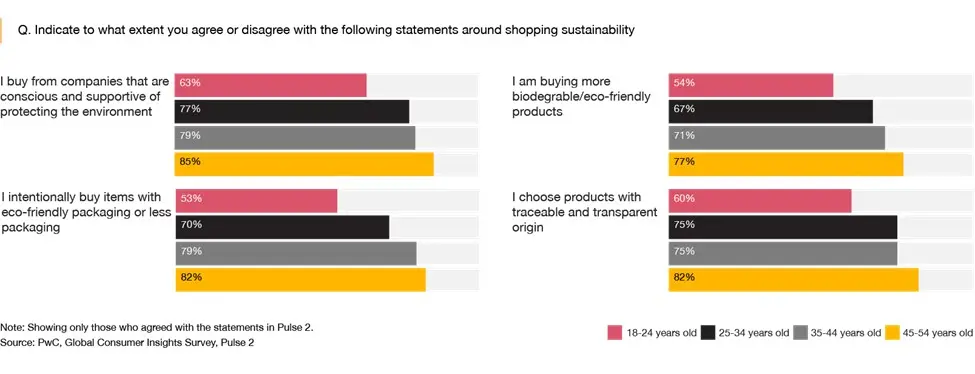- To seize the opportunities ahead, retailers in the Middle East need to repair, rethink and reconfigure their strategies to align with consumer needs
Today, PwC Middle East launched the Middle East findings of the 2021 Global Consumer Insights Survey titled “More digital and sustainable: post pandemic priorities for Middle East consumers” which takes a look at how consumer behaviour has changed as a result of COVID-19.
Undoubtedly, confidence is rising across the region, with 58% of Middle East consumers confirming that they have become more optimistic about the economy. Despite this confidence, our results indicate that the economic and social consequences of COVID-19 have impacted consumer behaviour and that those changes are here to stay.
Key consumer trends accelerated by the pandemic:
An accelerated shift to online and mobile shopping
- 67% of regional consumers believe they have become more digital during the pandemic, compared to 51% of global consumers, particularly in Egypt where 72% of consumers confirmed that.
- Mobile is now the main online channel for shopping, with 47% of regional respondents saying they use their smartphones most frequently for purchases, compared with 39% of global respondents.
- A major consideration for Middle East consumers shopping online continues to be fast and reliable delivery with 38% of respondents ranking this as important.
In-store shopping is still important as part of multi-channel retail strategies
- Despite the pandemic, 56% of the Middle East consumers, compared with 45% globally, prefer visiting physical stores.
- 40% of consumers who shop in-store consider increased health and safety as one of the most important attributes for a physical store. Key safety measures that regional consumers highlighted include mandatory face masks (44%), social distancing (43%) and hand sanitisation stations (32%).
Price-sensitivity is increasing in the Middle East
- 57% of Middle East consumers indicated that they have been more price oriented during the pandemic and 66% said they have been focused on saving.
Middle East consumers are more health conscious
- 71% of Middle East consumers indicated that they have become more healthy during the pandemic. When shopping for groceries, 41% of respondents also said that they are willing to pay more for healthier options.
Socially aware consumers are on the rise
- COVID-19 has reinforced the growing awareness of social and environmental sustainability with 65% of regional consumers reporting that they have become more eco-friendly during the pandemic.
- 75% of Middle consumers say they buy from companies that are environmentally conscious, compared with 54% globally; and 72%, versus 55% globally, say they choose products with a traceable and transparent origin.
Older consumers are more likely to be focused on sustainability


Norma Taki, Consumer Markets Leader and Transaction Services Partner, PwC Middle East commented: “Digitalisation and sustainability are firmly at the top of consumers’ agendas. To prepare for the future, retailers across the region will need to be fast and agile to capture business from a rising generation of youthful, socially aware consumers who are digitally savvy.”
She added: “The speed of the shift in consumer sentiment reflected by our findings is a reminder that retailers cannot afford to adopt a wait-and-see strategy as the region’s shoppers emerge from the pandemic and the related economic uncertainty and emotional stress. A new, digitised market is taking shape, which already looks increasingly different from the region’s pre-pandemic consumer landscape.”
PwC adopted a ‘pulse’ approach for its 2021 Global Consumer Insights Survey in order to remain attuned to changes in the worldwide landscape and connected to the behaviours of the global consumer. The pulse surveys were put into the field in November 2020 and March 2021 and included respondents from the UAE, Saudi Arabia and Egypt.
-Ends-
About PwC
At PwC, our purpose is to build trust in society and solve important problems. We’re a network of firms in 155 countries with over 284,000 people who are committed to delivering quality in assurance, advisory and tax services. Find out more and tell us what matters to you by visiting us at www.pwc.com
Established in the Middle East for 40 years, PwC has 22 offices across 12 countries in the region with around 6,000 people. (www.pwc.com/me ).
PwC refers to the PwC network and/or one or more of its member firms, each of which is a separate legal entity. Please see www.pwc.com/structure for further details.
© 2021 PwC. All rights reserved
© Press Release 2021
Disclaimer: The contents of this press release was provided from an external third party provider. This website is not responsible for, and does not control, such external content. This content is provided on an “as is” and “as available” basis and has not been edited in any way. Neither this website nor our affiliates guarantee the accuracy of or endorse the views or opinions expressed in this press release.
The press release is provided for informational purposes only. The content does not provide tax, legal or investment advice or opinion regarding the suitability, value or profitability of any particular security, portfolio or investment strategy. Neither this website nor our affiliates shall be liable for any errors or inaccuracies in the content, or for any actions taken by you in reliance thereon. You expressly agree that your use of the information within this article is at your sole risk.
To the fullest extent permitted by applicable law, this website, its parent company, its subsidiaries, its affiliates and the respective shareholders, directors, officers, employees, agents, advertisers, content providers and licensors will not be liable (jointly or severally) to you for any direct, indirect, consequential, special, incidental, punitive or exemplary damages, including without limitation, lost profits, lost savings and lost revenues, whether in negligence, tort, contract or any other theory of liability, even if the parties have been advised of the possibility or could have foreseen any such damages.



















